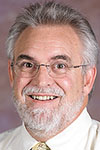Jeb Bladine: Robocall enlivens Mac council race
At a time when explosive devices are being mailed to critics of the Trump administration, it seems trivial to complain about an irritating robocall in a McMinnville City Council campaign. But that’s why we have in both national and local news.
Here’s a quick recap:
Incumbent councilman Sal Peralta believes Ron Fennern, spouse of Yamhill County Commissioner Mary Starrett, launched an anonymous robocall that included one falsehood and two red herrings. Fennern, a supporter of challenger Chris Chenoweth, heckled Peralta at a recent candidates’ forum.
Fennern and Chenoweth both denied involvement in the robocall. Peralta believes the voice belongs to Fennern, and said Fennern’s contempt dates back to past political clashes with Starrett.
Much ado about nothing? Not in my mind. It’s always illegal to lie in political campaigns, and anonymity is cowardice, if not deceit.
Robocalls are legal, much to the chagrin of phone owners. The Internet abounds with auto-call services for fractions of a penny per call. Diverse federal and state rules apply, but aren’t always observed.
Oregon for years prohibited anonymous political ads, signs, publications and broadcasts. A 1999 attorney general’s opinion declared the law an unconstitutional violation of free speech “as currently written,” so in 2001 legislators wiped that statute from the books.
It doesn’t just end there. State law doesn’t authorize anonymous political robocalls; it simply ignores the issue of identification. The Federal Communications Commission is not so reticent, as per this FCC rule:
“All prerecorded voice message calls, campaign-related and otherwise, must include certain identification information: the identity of the business, individual, or other entity initiating the call … must be stated clearly at the beginning of the message; and the telephone number of the calling party must be provided either during or after the message.”
“Consumers,” an FCC spokesman told me this week, “are always welcome to file complaints.” People are advised to first study the FCC-enforced Telephone Consumer Protection Act.
Recorded robocalls can be benign, even helpful. Linfield College, for example, uses robocalls to update sports fans about events and tickets.
There are smart phone apps to vex unwelcome live robocalls, including one with a robot voice using verbal tricks to waste the caller’s time.
Robocalls are not explosive devices in the mail. Still, something about this McMinnville robocall story smacks of the divisive politics that so divides the country at large. Just for fun, we’re waiting for cost information of professional voice-identification services.
Jeb Bladine can be reached at jbladine@newsregister.com or 503-687-1223.










Comments